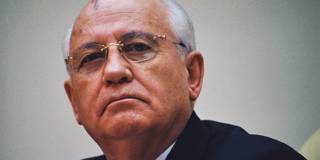A month after Mikhail Gorbachev’s death, debates about his life and legacy continue. A 21-year-old interview with the former Soviet leader suggests that he understood Russia’s problems, needs, and proper place in the world far better than its current leader does.
WASHINGTON, DC – The death in August of Mikhail Gorbachev, the last leader of the Soviet Union, sent me back to an extended interview I conducted with him in 2001. Reading the transcript anew, I was struck not only by the clarity of his thinking and the strategy that had motivated him to end the Cold War, but also by his conditional view – even then – of Russian President Vladimir Putin.

WASHINGTON, DC – The death in August of Mikhail Gorbachev, the last leader of the Soviet Union, sent me back to an extended interview I conducted with him in 2001. Reading the transcript anew, I was struck not only by the clarity of his thinking and the strategy that had motivated him to end the Cold War, but also by his conditional view – even then – of Russian President Vladimir Putin.